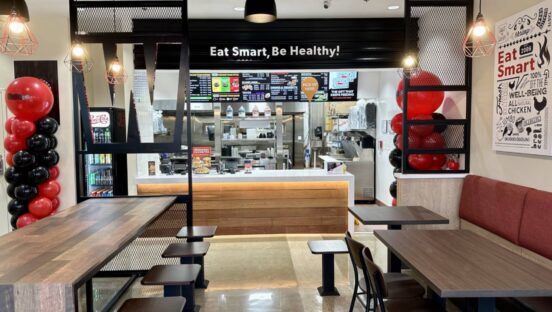Subscribe to “Fast Forward”: iTunes | Spotify | Google Play | Stitcher
The fast-casual industry has proved fertile ground for many global cuisines. Latin American and Mediterranean foods in particular have risen to popularity through fast casual, with brands like Chipotle, Moe’s, and CAVA helping to push their respective cuisines into the national spotlight.
Asian brands, however, have struggled to find a national foothold, with the exception of Panda Express, which did $3.4 billion in sales at 2,100-plus locations in 2018. The rest of the Asian pack is mostly made up of smaller emerging chains with plenty of work left to do to compete on the national front.
Teriyaki Madness is one such emerging brand that is attempting to challenge Panda’s Asian category throne. The Seattle-style teriyaki franchise was founded in Las Vegas in 2004, and has since grown to more than 50 locations across the U.S., with as many as 80 expected by the end of the year.
Michael Haith, who acquired Teriyaki Madness from its founders in 2012 after leading foodservice businesses like Maui Wowi and Doc Popcorn, says Americans are ready for different culinary styles than what dominates today.
“People are … getting beyond the burgers and sandwiches and the pizza, which they’ve become accustomed to,” he says. “I think there’s a migration to new flavors and Asian flavors, especially. I think people are starting to eat healthier. And Asian food really is a little bit healthier.”
Haith says the company is well positioned to thrive in today’s marketplace. While Teriyaki Madness’s business used to be split roughly 50/50 between dine-in and takeout, he says, the off-premises business now accounts for as much as 80–90 percent of business in some stores. The product travels well, he says, and third-party delivery has especially opened new opportunities for getting food to guests.
Another thing catching customers’ attention is Teriyaki Madness’s irreverent marketing. Haith describes the company as being “left-of-center,” an approach that he says has helped to build a loyal following—but not without a bit of controversy.
“We like to ruffle a few feathers,” he says. “We know that our marketing is working if we get a couple people complaining about it, and we do that on purpose.”
He points to the time the company marketed its “cage-free carrots,” which led to an angry call from a customer who said it “denigrated the chickens.” But it’s all part of Teriyaki Madness’s master plan, Haith says.
“There’s so much noise out there. There’s so many different choices for the consumer,” he says. “How can we position ourselves where people can identify with the culture and become raving fans? I think we’ve done a great job of that.”
To learn more about Teriyaki Madness and how Haith and his team are setting it up for success, listen to the latest episode of QSR’s podcast “Fast Forward.”






